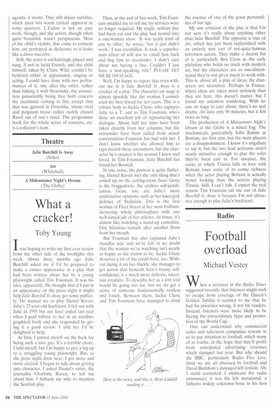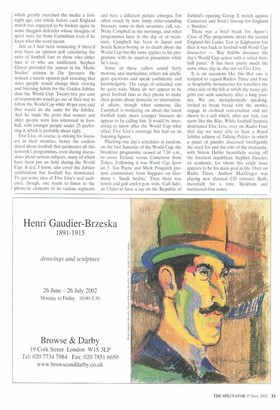Football overload
Michael Vestey
\When a reviewer in the Radio Times suggested recently that listeners might wish to escape from coverage of the Queen's Golden Jubilee it seemed to me that he had his priorities wrong, if not his readers. Instead, listeners were more likely to be fleeing the extraordinary hype and promotion of the World Cup.
One can understand why commercial radio and television companies scream at us to pay attention to football, which many of us loathe, in the hope that they'll profit from anticipated advertising revenues which slumped last year. But why should the BBC, particularly Radio Five Live, think we are all obsessed by football and David Beckham's damaged left testicle. Ah, I stand corrected: I misheard the radio announcer; it was his left metatarsal, a hitherto widely unknown bone in his foot which greatly exercised the media a fortnight ago, and which, before each England match was expected to be broken again by some thuggish defender whose thoughts of sport were far from Corinthian even if he knew what the word meant.
Just as I had been wondering if there'd ever been an opinion poll calculating the ratio of football fans to those who either hate it or who are indifferent, Stephen Glover provided the answer in his 'Media Studies' column in The Spectator. He noticed a recent opinion poll revealing that more people would change their viewing and listening habits for the Golden Jubilee than the World Cup. Twenty-five per cent of respondents would go out of their way to follow the World Cup while 40 per cent said they would do the same for the Jubilee. And he made the point that women and older people were less interested in football, with younger people under 25 preferring it, which is probably about right.
Five Live. of course, is striving for listeners in their twenties, hence the endless drivel about football that permeates all this network's programmes, even during discussions about serious subjects, many of which have been put on hold during the World Cup. It did, I know, also cover the Jubilee celebrations but football has dominated. To get some idea of Five Live's real audience, though, one needs to listen to the phone-in elements of its various segments and here a different picture emerges. I'm often struck by how many older-sounding listeners. some in their seventies, call, say. Nicky Campbell in the mornings, and other programmes later in the day or at weekends. Campbell has been in Japan and South Korea boring us to death about the World Cup but the same applies to his programme with its stand-in presenters while he's away.
Some of these callers sound fairly moronic and inarticulate, others ask intelligent questions and speak confidently and knowledgably. The range of articulacy can be quite wide. Many do not appear to be great football fans as they phone to make their points about domestic or international affairs, though when someone like Campbell is twittering on about the latest football topic more younger listeners do appear to be calling him. It would be interesting to know after the World Cup what effect Five Live's coverage has had on its listening figures.
Plucking one day's schedules at random, on the first Saturday of the World Cup, the breakfast programme ceased at 7.30 a.m., to cover Ireland versus Cameroon from Tokyo. Following it was World Cup Sport on 5. 'Ian Payne and Mark Pougatch present commentary from Sapporo on Germany v. Saudi Arabia.' Then there was tennis and golf until 6 p.m. with, 'Call Adrian Chiles to have a say on the Republic of Ireland's opening Group E match against Cameroon and Sven's line-up for England v. Sweden.'
There was a brief break for Agnew's Close of Play programme about the second England–Sri Lanka Test at Edgbaston but then it was back to football with World Cup Interactive — 'Ray Stubbs discusses the day's World Cup action with a select football panel.' It has been pretty much the same since, day in, day out on Five Live.
It is on occasions like this that one is tempted to regard Radios Three and Four as hospitable monasteries for travellers the other side of the hill at which the weary pilgrim can seek sanctuary after a long journey. We are, metaphorically speaking, invited to break bread with the monks, engage in civilised conversation and are shown to a cell which, after our trek, can seem like the Ritz. While football hysteria dominated Five Live, over on Radio Four that day we were able to hear a Royal Jubilee edition of Talking Politics in which a panel of pundits discussed intelligently the need for and the role of the monarchy, with Simon Helfer beautifully seeing off the fanatical republican Stephen Haseler, an academic, for whom this single issue appears to be his main goal in life. Over on Radio Three, Andrew MacGregor was playing new classical CD releases. Both, mercifully for a time, Beckham and metatarsal-free zones.



































































 Previous page
Previous page